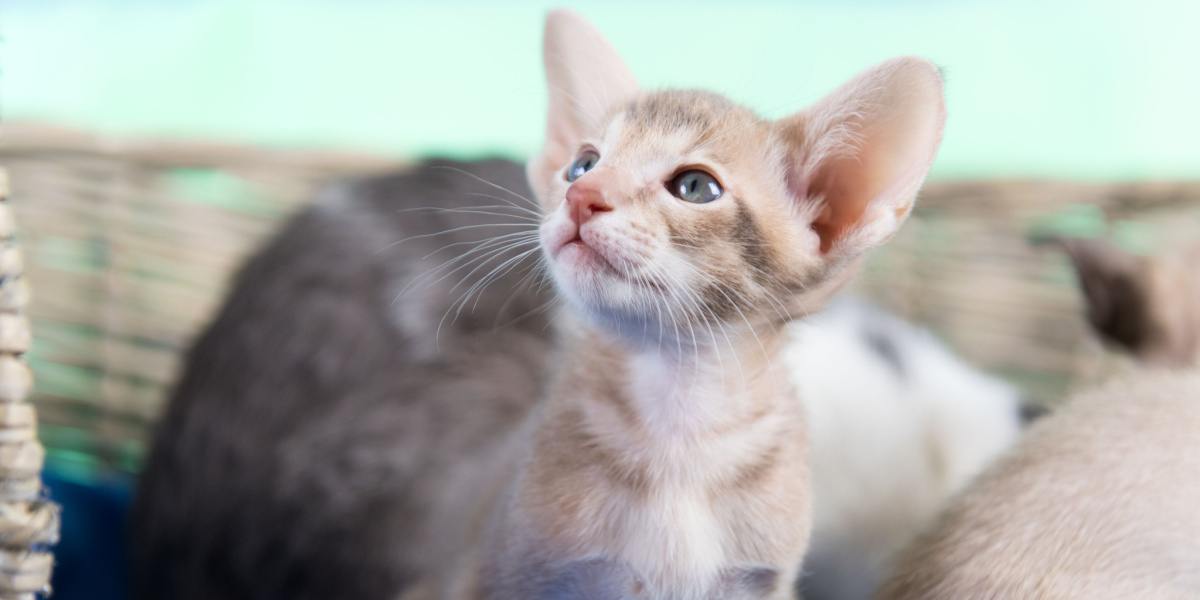
Will adopting one and only kitten guarantee loneliness and a poorly behaved kitty? “Single kitten syndrome” has really intrigued me since it’s something I haven’t encountered during my practice in feline behavior. So I decided to do some research on single kitten and littermate syndrome in cats. This yielded some interesting results, however, not from the scientific community.
Since cats are individual creatures, labeling won’t solve any behavioral problems. Instead, we should focus on each kitten’s early experiences and distinct needs. Cat education is essential to help owners build a powerful relationship through environmental enrichment and training to make sure kittens are well-socialized within their first two to four months. This will also instill life skills and create resilient cats.
If you’re thinking of getting a kitten, then this article is for you!
What Is Single Kitten Syndrome?

While adopting a single kitten is common, some folks worry a cat without another kitten playmate will no grow to be properly socialized.
There is no scientific evidence of “single kitten syndrome,” which is also known as “Tarzan Syndrome.” Still, many homing centers and several feline behaviorists believe that if a kitten under 12 weeks of age is adopted by themselves without a sibling or additional cat of the same age then they could develop this condition. Consequences of single kitten syndrome, it is said, is that the kitten will become bored, become stressed, won’t learn bite inhibition, and will exhibit behavioral problems. These problems include chewing or scratching objects and urinating or defecating outside the litterbox.
Also Read: How To Take Care Of A Kitten: The Complete Guide
Is Single Kitten Syndrome Real?
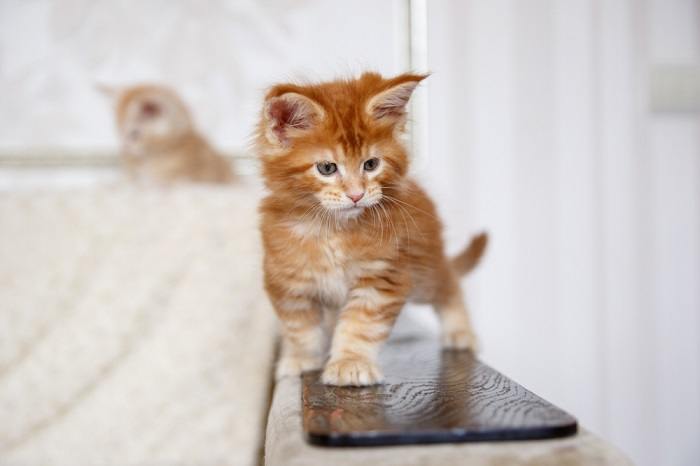
The jury is still out on if single kitten syndrome is even real, although many cat behaviorists and specialists believe it to be a real condition.
Well, the answer to if single kitten syndrome is even real depends on who you ask and on the individual cat!
Single kitten syndrome is a real condition according to countless animal organizations and foster carers. The belief that one kitten is going to be lonely, clingy, anxious, destructive, and aggressive toward their owner while two kittens will prosper into happy, healthy cats, is widespread. Anecdotally many of my cat-sitting clients are social, happy, single-household cats.
Many people with experience in hand-rearing kittens find that the kitten’s behavior, and their behavior as an adult cat, is different from a cat that has been raised by a queen. Several noted that hand-reared cats struggle to understand other cats’ actions. They don’t know when to stop playing or are unable to grasp when to leave another cat alone.
Such reports tend to be more frequent when a single kitten has been hand-reared as opposed to a litter. This may be likely, since the kitten has neither social interactions with their mother nor their siblings. Therefore, where possible, a single kitten who lost their mother should be nurtured by a lactating foster mom.
On the other hand, so-called littermate syndrome in cats is a term that describes an extreme bond between two siblings. It’s described as a social disorder that may cause severe anxiety or panic if both offspring are separated for a particular period. Fortunately, this doesn’t happen in felines.
Unfortunately, there hasn’t been any research to substantiate the existence of either a single kitten syndrome or littermate syndrome. One recent study concluded no links between aggression and early social exposure (bottle-reared, early rehoming, singleton). Rather, the majority of the factors were associated with the cat’s personality, the home environment, and the training methods applied by owners.
Also Read: The 8 Best Kitten Foods Of 2023
About Sibling Bonding In Cats
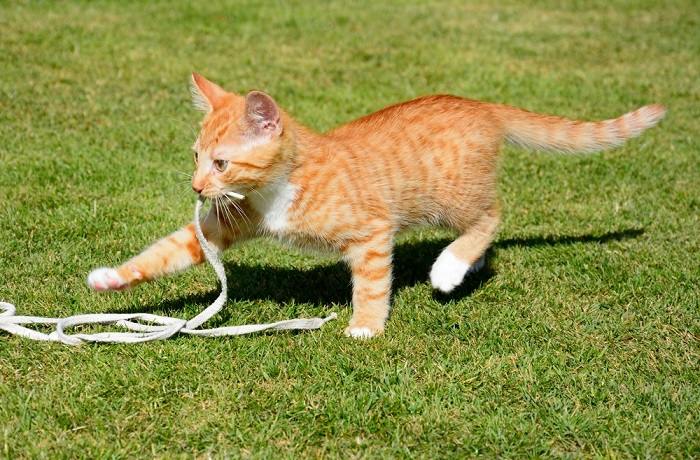
Littermates form a powerful connection and bond with each other through play and predatory behaviour.
Sibling bonding is especially important to cats since it plays a significant role in the development of social skills. Social play is particularly crucial between 4 – 12 weeks old. Littermates form a powerful connection through play and predatory behavior
Kittens watch their mom and littermates catch live prey and begin to achieve eye-paw coordination that permits them to catch fast, small-moving objects. Siblings also pounce, bat, and chase each other which are all produced by both predatory and combative social behavior.
Kittens without siblings eventually form social attachments. However, they are generally slower to learn social skills than typically reared kittens. Solitary kittens don’t learn bite inhibition during agonistic play behavior if they target human flesh instead of siblings. Sadly, a human can’t teach boundaries of appropriate physical strength like another kitten.
Lastly, this might come as a shock to some owners, but sibling cats don’t always form lifelong bonds. Once a cat reaches social maturity (adult social behavior development) between 2 – 4 years, they may simply grow apart. Related cats can even become aggressive towards one another with different tolerance levels towards other pets.
Also Read: Sexing Kittens: How To Determine The Sex Of Your Kitten?
Should You Adopt Littermates?
Yes, you should adopt littermates together, since they’re going to adapt to a brand-new home environment much more quickly.
Littermates are far more receptive to forming social attachments and learning from one another as long as they groom each other, sleep, eat, and play together during their socialization period.
Certain pedigrees of cats are more human-oriented and won’t like to be left alone for extended periods. If you’re employed full-time, it would be worth acquiring two littermates for companionship.
Before adopting two kittens, do some research to ensure your current environment is suitable for two cats. You’ve got to consider ongoing healthcare costs and lifestyle suitability to nurture siblings.
Also Read: 22 Fun Facts About Kittens
Tips For Ensuring Well-Socialized Kittens
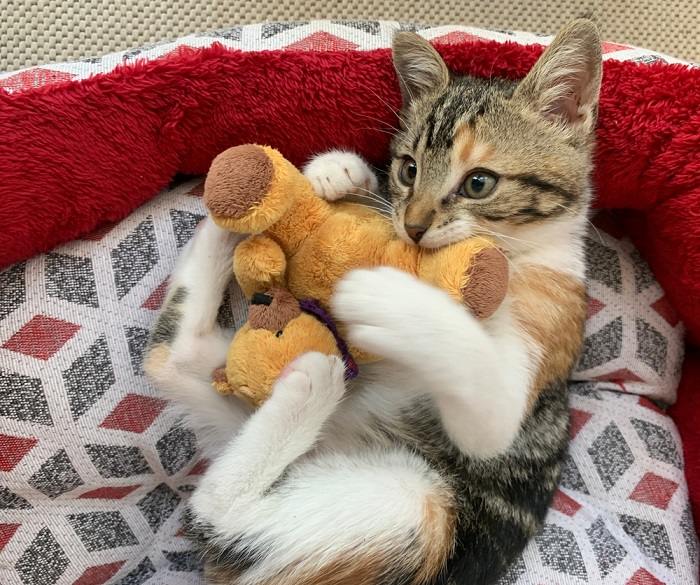
Some kittens won’t mind being independent and solitary. Others will struggle with being left alone for longer periods of time.
The early socialization period in cats is between 2-7 weeks. During this time, a kitten’s brain and sensory system will develop. A well-socialized kitten needs to be exposed to new people and a variety of experiences past the early socialized phase. Segregating kittens may result in nervousness and fearfulness.
Also Read: Fading Kitten Syndrome: Causes, Symptoms, & Treatment
Our top tips for kitten socialization continuum:
1. Teach Kittens To Associate Owner Handling With Positive Consequences
To prevent aggression towards people that’s motivated by anxiety or fear, help kittens to associate being handled with positive consequences. Encourage your kitten to approach you for interaction instead of picking them up. If the kitten shows signs of tension and won’t approach, follow a program of desensitization and counterconditioning instead.
Also Read: When Do Kittens Open Their Eyes?
2. Encourage Positive Interactions With Strangers
Introduce handling by various people of different ages, and sexes, including kids. Your kitten will learn to cope with being petted and touched by familiar people. Consistently end these handling sessions on a positive note so your cat recalls it as a positive, feel-good experience.
Also Read: Eye Diseases In Neonatal Kittens: Causes, Symptoms, & Treatment
3. Introduce Novel Objects In A Gradual Manner
Another important aspect of kitten socialization is familiarizing them with novel objects in a gradual manner. This process is known as ‘social referencing.’ You can do this by providing the kitten with a variety of safe floor textures to walk on or offering new sizes and newly shaped objects for them to investigate.
Also Read: How To Introduce A New Kitten To An Older Cat
4. Habituate To Household Noises
Similarly to habituation towards novel objects, social referencing should also include experiences that involve all the kitten’s senses that they will experience in an average home. New sounds can be introduced by playing kitten socialization sounds of household noises, like pots and pans, mobile phones, the doorbell, a hairdryer, a washer, and a vacuum.
Also Read: The Complete Feeding Guide From Kittens To Seniors
5. Familiarize The Kitten With Future Household Pets
Slowly introduce your kitten to other species while they are supervised. These species could be pocket pets, birds, or dogs that they may encounter later in life. To introduce a dog, rub a cloth over the dog and place it in the kitten’s environment. Next, introduce them at a distance. Make sure that the dog is calm and friendly. Then approach closer when the dog is on a harness and leash, while in a resting position to minimize scaring the kitten.
Also Read: The Complete Guide to Bottle Feeding Kittens
6. Teach Kittens How To Play Nice
Although it’s often irresistible to play with kittens by wriggling your fingers or toes, this isn’t an appropriate method of play. From day one, direct your kitten’s play onto lifeless objects like ping pong balls, scrunched-up paper, catnip mice, and fishing pole-type toys, where a person moves a wand while the kitty pursues the toy dangling from the tip of the wand. Always supervise kittens with such toys to reduce the entanglement risk if left alone.
Also Read: Can Kittens Eat Adult Cat Food? A Vet Explains
Conclusion
Pet professionals and animal organizations have a duty of care to provide the most appropriate home for every kitten based on their genetics, health condition, early experiences, and inherent temperament. There are no set rules. Some kittens will prefer to live life as solo cats, while others remain bonded to their siblings.
Ultimately, we still need more scientific research into the behavioral outcomes of kittens acquired as solo cats.
Also Read: Why Does My Cat Steal My Other Cat’s Food?
Frequently Asked Questions
Is it better to get two kittens from the same litter than just one?
Generally, yes, it is better to get two kittens from the same litter. They will learn from each other, provide security and comfort for one another, guarantee constant playmates, reduce feelings of anxiety, and potentially prevent behavioral problems.
Can brother and sister cats live together?
Brother and sister cats can live happily together. In fact, I can attest to it having male and female siblings who enjoy spending time and playing together, aside from a few occasional disagreements. Certain siblings can have a tight bond for life, while others won’t have this connection once they reach social maturity and will just tolerate each other.
Do cats get sibling syndrome?
Cats don’t get sibling syndrome since they’re capable of spending time alone. Adopting siblings is beneficial if you wish to acquire two cats at once. They’ll integrate into a brand-new household with greater ease. However, their relationship can change during social maturity given that each sibling is genetically unique.
Do cats get littermate syndrome?
There’s no such thing as a littermate syndrome in cats. This is a common phenomenon amongst dogs that hasn’t been substantiated by science either.
-
Care, I. C. (2020, Septmeber 15). Advanced Feline Behaviour for Vet Professionals, Module 3 Reproduction and Behavioural development in kittens. (ISFM, Compiler) UK. Retrieved September 11, 2022
-
Heath, A. G. (2016). Normal Social Behaviour. In I. R. Heath, Feline Behavioural Health and Welfare (pp. 38-39). St Louis: Elsevier Inc. Retrieved September 09, 2022
-
L.PearlLeeNiel, K. A. (2021, March). Risk factors for aggression in adult cats that were fostered through a shelter program as kittens. Science Direct, 236. Retrieved September 14, 2022, from https://www.sciencedirect.com/science/article/abs/pii/S0168159121000381
-
Trevorrow, N. (2012, Summer). Kitten Socialisation. UK. Retrieved September 13, 2022





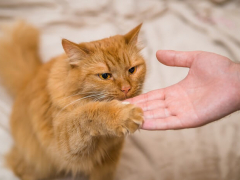


I found a 3 1/2 week old kitten in the middle of the highway. I brought her home, hoping to get her into a cat rescue, but nobody was able to take her. So I started taking care of her and feeding her with a syringe cause she wouldn’t take a bottle every two hours. She’s now 14 weeks and she is a beautiful little kitten. Since I have always been a dog person in fact, I have two small dogs I started reading and watching all I could about raising cats during the last three months that’s a lot of information! And I was worried about a single cat syndrome, but my kitten interacts very well with my two dogs. In fact, she is bonding with my little 13 pound dog.. she has all the appropriate toys and towers and scratchers and etc. but I’ve raised her as I raised my dogs. My family says I turned her into a dog! She sits on the couch with us at night or laying with my dogs, she runs and plays on her own and it’s very entertained, and I play with her, but other than that, she hangs with me and the dogs and she is following some verbal commands. She is not aggressive. She had a learning curve initially on her, biting too hard but by just telling her and go easy she very rarely bites hard anymore! So I haven’t seen any literature where people have talked about the single cat with dogs and that environment! So I have nothing to go by About cats and dogs. She just became one of the pack! So I have to wonder are there any issues or negative with her bonding just with dogs?
Hi Vicky
Thank you for reading our article and for saving your beautiful kitten.
There’s nothing wrong or harmful with her bonding just with dogs.
Many cats develop amazing friendships with other species, like dogs. My previous cat was bonded to my border collie; they used to play, hide, and nap together in the wardrobe on stormy days.
Sending you love & healing
Melina
Thank you for this! I wish more trained, educated professionals in the field like yourself would speak out on this topic. Rescues and independent shelters seem to have taken this so called “syndrome” viral and it is pervasive. The potential for this to lead to an exponentially increasing number of teenage to adult cats in shelters with this new “requirement” to adopt two kittens and/or young cats together backfires because the two cats do not get along as they grow up together, or the cost of two cats gets too much for owners, seriously worries me.
AMEN